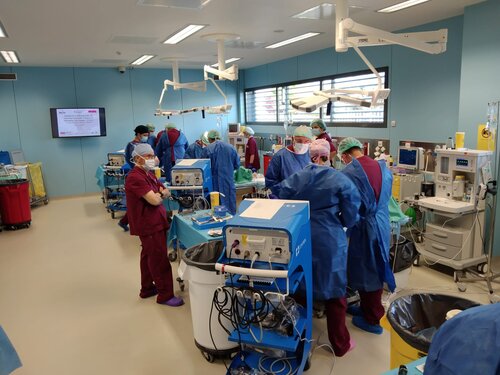CREBA offers a unique course on the management of complications in the approach to thoracic and lumbar injuries for spinal surgeons, traumatologists and neurosurgeons
Coordinated by specialists from the Arnau de Vilanova University Hospital in Lleida and the Clavel Institute - Hospital Quirón in Barcelona
The Centre for Applied Biomedical Experimental Research (CREBA) hosts the 4th edition of the course 'Management of Complications in Anterior Thoracic and Abdominal Spine Approach. In vivo Workshop in Porcine Model'. This is the only course of its kind in Spain for spine surgeons to learn how to recognise and manage the different complications that can usually appear during anterior thoracic and lumbar spine approaches.
A large multidisciplinary team consisting of spine, vascular, general, thoracic and urological surgeons will offer participants the opportunity for supervised live tissue training on anaesthetised pigs. The course is coordinated by the specialist physician of the Spine Unit of the Orthopaedic Surgery and Traumatology Service of the Arnau de Vilanova University Hospital of Lleida, Pau Solé Florensa, and the specialist physician of the Spine Unit of the Neurosurgery and Spinal Surgery Service of the Clavel Institute - Hospital Quirón of Barcelona, Ignasi Català.
At the end of the course, participants should be able to:
- Understand the benefits and risks of the possible spinal approach routes: anterior, lateral, posterior oblique, percutaneous, as well as their limitations.
- Know the tricks and errors of anterior thoracic and lumbar spine approaches. Perform experimental surgery on live tissue to learn how to:
- Identify structures and strategies to avoid damage to relevant viscera.
- Practical visceral vascular, intestinal, ureteral, pulmonary, diaphragmatic and oesophageal visceral management.
- Show practical competence in the repair of vascular, intestinal, ureteral, pulmonary, diaphragmatic and oesophageal injury.
CREBA is dedicated to research and training in the field of Biomedicine. Its facilities include teaching and simulation classrooms, as well as four experimental operating theatres equipped for open and laparoscopic surgery and other interventional techniques. One of them has 5 operating tables, which makes it ideal for this type of training activities in new technologies.

The only course in Spain with these characteristics






